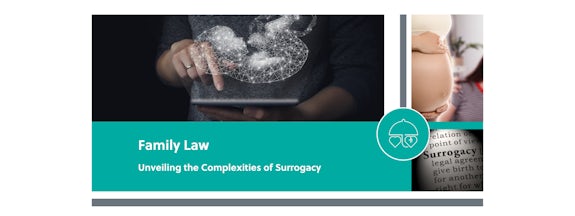
By Sarah Feeney
May 9, 2025

The Pope has made headlines this week by calling for a ban on surrogacy and the “commercialisation” of pregnancy worldwide; describing surrogacy as a grave violation of the mother and child. There seems to have been a fundamental misunderstanding, as commercialised surrogacy (in other words, paying someone to carry your child/being paid for being a surrogate) is in fact already illegal in many countries across the world. In the UK, surrogate mothers are not entitled to charge a fee. Only their reasonably incurred expenses are covered.
The legal complexities associated with surrogacy are often misunderstood. Where a child is born to a surrogate, even where the child was conceived solely using the biological material of the prospective parents and not the surrogate, the prospective parents are not both legally the parents of the child when the child is born. Orders are required from the court to terminate the parental rights and responsibilities of the surrogate (and potentially other third parties such as the surrogate’s spouse) and to give parental rights and responsibilities to the prospective parents. The legal path to parenthood by surrogacy is navigable, but by no means straightforward.
When there are headlines about famous faces using surrogates, judgement is often swift, and in particular women come under scrutiny for “choosing” to use a surrogate, with many overly presumptuous comments made along the lines of “she didn’t want to ruin her body”, and “she’s just lazy”. These women then find themselves having to disclose intimate details about their health to justify their “choice” to strangers. When a same sex couple, or a single male parent, uses a surrogate, there is often less speculation as to why they decided to go down that route, as the answer is obvious that, physiologically, they couldn’t carry a child themselves. No third party is placed to make any kind judgement in these situations, especially not knowing a person’s full medical background.
I say “choosing”, because for many it isn’t really a choice – surrogacy is often a last resort. The vast majority of parents who use surrogates do so because they have no other way of having biological children of their own, and so it is not necessary a choice to not carry a child themselves, rather, a choice between having a biological child of their own, or not at all/risking their health and the health of their unborn child. As a relatively new mother myself, I can say that pregnancy and parenthood is challenging enough, without adding in the additional stress, complications and legalities that come from having to use alternative methods to conceive and have a child. Children born in the UK by way of surrogates are so wanted and loved by their parents, and doing the job we do, that really is what matters.
For any further information, please contact Shona Young, Senior Associate Family Law on syoung@gilsongray.co.uk

Shona is a Senior Associate in Gilson Gray’s Family Law Team. She has worked exclusively in the area of Family Law since qualifying as a solicitor in 2017, and specialised in the field during her traineeship.